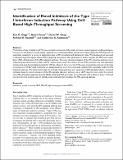Identification of novel inhibitors of the type I interferon induction pathway using cell-based high-throughput screening
Abstract
Production of type I interferon (IFN) is an essential component of the innate immune response against invading pathogens. However, its production must be tightly regulated to avoid harmful effects. Compounds that modulate the IFN response are potentially valuable for a variety of applications due to IFNs beneficial and detrimental roles. We developed and executed a cell-based high-throughput screen (HTS) targeting components that participate in and/or regulate the IRF3 and NF-κB branches of the IFN-induction pathway. The assay detects activation of the IFN-induction pathway via an eGFP reporter gene under the control of the IFN-β promoter and was optimized, miniaturized and demonstrated suitable for HTS as robust Z’ factor scores of >0.6 were consistently achieved. A diversity screening set of 15,667 small molecules was assayed and two novel hit compounds validated that specifically inhibit the IFN- induction pathway. We demonstrate that one of these compounds acts at, or upstream of IRF3 phosphorylation. A second cell-based assay to detect activation of the IFN- signaling (Jak-Stat) pathway via an eGFP reporter gene under the control of an ISRE containing MxA promoter also performed well (robust Z’ factor = >0.7), and may therefore be similarly used to identify small molecules that modulate the IFN-signaling pathway.
Citation
Gage , Z O , Vasou , A , Gray , D , Randall , R E & Adamson , C S 2016 , ' Identification of novel inhibitors of the type I interferon induction pathway using cell-based high-throughput screening ' , Journal of Biomolecular Screening , vol. 21 , no. 9 , pp. 978-988 . https://doi.org/10.1177/1087057116656314
Publication
Journal of Biomolecular Screening
Status
Peer reviewed
ISSN
1087-0571Type
Journal article
Collections
Items in the St Andrews Research Repository are protected by copyright, with all rights reserved, unless otherwise indicated.

